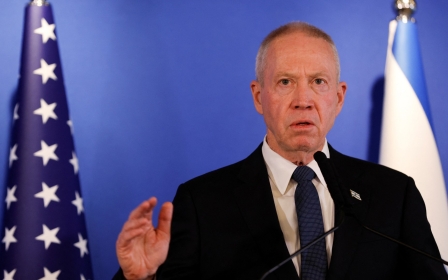Israel: Attorney general says Netanyahu's role in judicial overhaul is illegal

Israel's attorney general on Friday warned Prime Minister Benjamin Netanyahu that he has violated the law by saying he would get personally involved in the government's highly controversial judicial overhaul.
Gali Baharav-Miara's remarks were made in response to Netanyahu's speech a day earlier when he vowed to press ahead with the reforms, including plans to give the government full control over the committee that appoints judges, which he has said will pass in the Knesset next week.
Netanyahu, who is on trial for corruption, also vowed to pass a key bill next week that would place the power to make appointments to the Supreme Court directly in the hands of the coalition government.
The prime minister's statement came hours after parliament passed a key piece of legislation on Thursday that would shield him from being declared unfit for office by the attorney general.
"Your statement last night, and any action taken by you [regarding the judicial overhaul] is illegal and tainted by a conflict of interest," Baharav-Miara said.
The attorney general said the amendment to the bill does not exempt him from his obligation to comply with an agreement he signed with the Supreme Court in 2020.
She said this forbids him from being involved in changes to the judicial system while on trial for three counts of corruption due to a conflict of interest.
The judicial reforms could enable Netanyahu to evade conviction or see his case dismissed.
Since being indicted in 2019, Netanyahu has publicly railed against the justice system, claiming it is biased against him.
Now he is signalling that he is willing to ignore the 2020 deal, waiting until after the Knesset passed the legislation protecting him from the attorney general before doing so.
In an open letter lambasting Netanyahu, the attorney general said the prime minister's announcement meant that he had broken the law.
“You violated the ruling of the Supreme Court, according to which, as a prime minister accused of crimes, you must refrain from taking actions that give rise to a reasonable fear of the existence of a conflict of interest between your personal interests relating to the criminal proceedings and your role as prime minister,” Baharav-Miara wrote.
“Last night you announced publicly that you intend to violate the Supreme Court’s ruling, and to act contrary to the opinion of the attorney general, which obligates you according to this ruling,” she said.
"Your statement last night and any further actions by you that violate that agreement are completely illegal and in conflict of interest."
Widespread protests
Israel is in the midst of one of the biggest political crises in its history, which has pitted Netanyahu’s far-right government against the country’s civil society, academic and business elite, and former government ministers and military figures.
Netanyahu's speech on Thursday came after he summoned Minister of Defence Yoav Gallant, ahead of a public intervention where he was expected to call for a halt to the government's plans to reform the judiciary.
For almost 12 weeks Israelis have taken to the streets to protest against what many believe is a judicial coup being carried out by Israel’s far-right government.
The protesters are hitting out against a plan that would give parliament the power to override the Supreme Court through a simple majority vote, and give lawmakers de facto control over court nominees.
It would also limit the court’s ability to block legislation that infringes on human and civil rights.
Israel has no constitution and there is little separation between the executive and legislative branches, as governments nearly always hold a majority in parliament.
This has historically meant the Supreme Court is the most effective check on government power.
Middle East Eye delivers independent and unrivalled coverage and analysis of the Middle East, North Africa and beyond. To learn more about republishing this content and the associated fees, please fill out this form. More about MEE can be found here.






